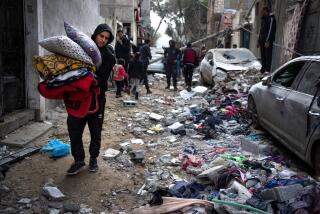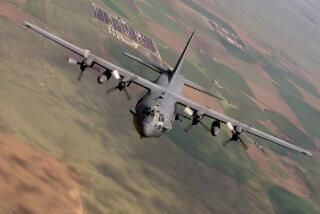With Targets Few and Elusive, the War Is Fodder for Diplomats
- Share via
The large deployment of U.S. military power now underway, including four aircraft-carrier groups in the northwest Indian Ocean, suggests that an invasion of Afghanistan is imminent, or perhaps a full-scale air offensive against Iraq as in 1991 but with today’s better bombs.
Neither option is even being considered. True, if there were proof that Saddam Hussein has been financing Osama bin Laden, massive retaliation would follow. But that could only happen after full-scale diplomatic preparations to persuade world opinion with solid evidence, which has yet to be uncovered.
As for a ground invasion, it is neither possible nor necessary. It is not possible because it would require months of preparation and the call-up of 300,000 reservists. It is not necessary because the Taliban can be defeated by cutting off its essential military supplies from Pakistan, while providing ample supplies to its enemy, the Northern Alliance. The latter is still recognized as the Afghan government by most countries.
The U.S. response to the Sept. 11 attacks must remain 95% diplomatic and only 5% military, if that. That is the inevitable result of the lack of worthwhile targets for either airstrikes or commando operations.
Osama bin Laden’s Al Qaeda, a loose network rather than a conventional organization, presents no high-value targets. Its headquarters are Bin Laden himself with his assistants, wherever they happen to be as they move about. Its supply depots are village houses. Its training camps are open fields or in foreign countries far away, such as U.S. flight schools.
To bomb Al Qaeda targets would therefore be useless in material terms, and counterproductive politically, because insignificant damage in Afghanistan would immediately be compared with the catastrophic damage inflicted in New York and at the Pentagon.
The Taliban, a loose grouping of armed bands rather than an army, is fighting the Tajiks and Uzbeks of the Northern Alliance. It must have ammunition storage for its artillery that can be identified and reliably destroyed by bombing. It also uses former Soviet tanks and other armored vehicles that can be attacked from the air, though less reliably. There are quite a few headquarters buildings in Kabul, Kandahar, Jalalabad and elsewhere but none is a target of high value.
Excluding single-armored vehicles, it is therefore hard to find 25 targets worth bombing in Afghanistan, as opposed to almost 3,000 major targets in Iraq in the 1991 war or 1,000 or so in Serbia in 1999.
Of course, “low-contrast” targets too elusive for airstrikes, such as Al Qaeda’s Arab fighters in their Kabul group houses, could be attacked by commandos, or “special operations” troops in U.S. terminology. Both the 75th Ranger battalion of elite infantry and Delta specialists have been sent to the area. Although there are many antiaircraft guns in Afghanistan, there is no radar defense perimeter and no fighter force to intercept intruders. Afghanistan can therefore be penetrated at will even by ordinary transport aircraft, let alone the Combat Talon C-130s of U.S. special operations forces that are equipped for extreme low-altitude flight at night, and which can land on any stretch of flat, hard ground.
But the U.S. Joint Chiefs of Staff, unlike their British and Israeli counterparts, have been very reluctant to authorize commando operations, especially since the October 1993 debacle in Mogadishu in which 18 Rangers and Deltas were killed. They have tended to insist on more complete intelligence than can be reasonably obtained, and when pressed by civilian officials they have offered feasibility studies instead of immediate action.
Now, after the death of thousands of civilians in New York, perhaps it will be different, perhaps the chiefs will allow their troops to be risked in combat. Even so, the lack of high-value targets makes it very hard to achieve significant results, unless local or Pakistani agents can actually guide U.S. commandos to kill or capture Bin Laden himself.
More to Read
Sign up for Essential California
The most important California stories and recommendations in your inbox every morning.
You may occasionally receive promotional content from the Los Angeles Times.













